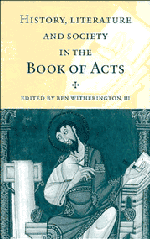Book contents
- Frontmatter
- Contents
- Preface
- PART I ISSUES OF GENRE AND HISTORICAL METHOD
- PART II HISTORICAL AND THEOLOGICAL DIFFICULTIES IN ACTS
- 6 Acts 6.1–8.4: division or diversity?
- 7 James and the Gentiles (Acts 15.13–21)
- 8 Kerygmatic summaries in the speeches of Acts
- 9 The “script” of the Scriptures in Acts: suffering as God's “plan” (βουλή) for the world for the “release of sins”
- 10 Luke's social location of Paul: cultural anthropology and the status of Paul in Acts
- PART III ISSUES OF LITERARY CRITICISM
- Index of biblical references
9 - The “script” of the Scriptures in Acts: suffering as God's “plan” (βουλή) for the world for the “release of sins”
Published online by Cambridge University Press: 02 February 2010
- Frontmatter
- Contents
- Preface
- PART I ISSUES OF GENRE AND HISTORICAL METHOD
- PART II HISTORICAL AND THEOLOGICAL DIFFICULTIES IN ACTS
- 6 Acts 6.1–8.4: division or diversity?
- 7 James and the Gentiles (Acts 15.13–21)
- 8 Kerygmatic summaries in the speeches of Acts
- 9 The “script” of the Scriptures in Acts: suffering as God's “plan” (βουλή) for the world for the “release of sins”
- 10 Luke's social location of Paul: cultural anthropology and the status of Paul in Acts
- PART III ISSUES OF LITERARY CRITICISM
- Index of biblical references
Summary
The ironic if not sobering conclusion of much of critical scholarship on Luke–Acts is that the suffering or death of Christ in itself plays no constitutive role in effecting the salvation that is proclaimed in Luke's second volume. “There is no trace of any Passion mysticism, nor is any direct soteriological significance drawn from Jesus' suffering or death. There is no suggestion of a connection with the forgiveness of sins.” Conzelmann's judgment has by and large remained in force some forty-plus years with only slight modifications. The divine necessity of the Christ to suffer is attributed to the comprehensive “will of God,” and Luke's use of traditional formulae in the Last Supper longer reading, 22. 19b–20, and in Acts 20.28 reflects his own willingness to admit some association, however muted, of Jesus' death with the cultus of sacrifice. Kümmel's survey and modification of Conzelmann's position is representative of much contemporary sentiment: “While Luke by no means entirely removes the redemptive significance of the death of Jesus he does not stress it.” This evaluation would seem particularly striking in light of Luke's two quotations from the Servant of Isaiah passages. But neither in Jesus' own quotation from Isa. 53.12 at the Last Supper nor in the reading from Isa. 53.7–8 of the Ethiopian finance minister in Acts 8.32–33 do the citations continue or include lines from the immediate contexts in which a vicarious atoning death is explicitly predicated of the Servant.
- Type
- Chapter
- Information
- History, Literature, and Society in the Book of Acts , pp. 218 - 250Publisher: Cambridge University PressPrint publication year: 1996
- 2
- Cited by



